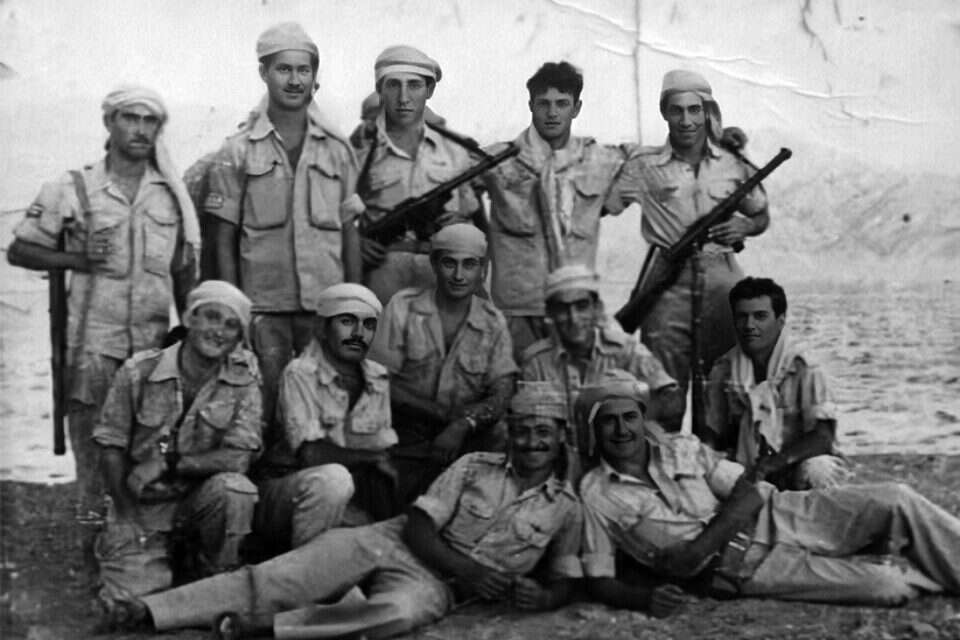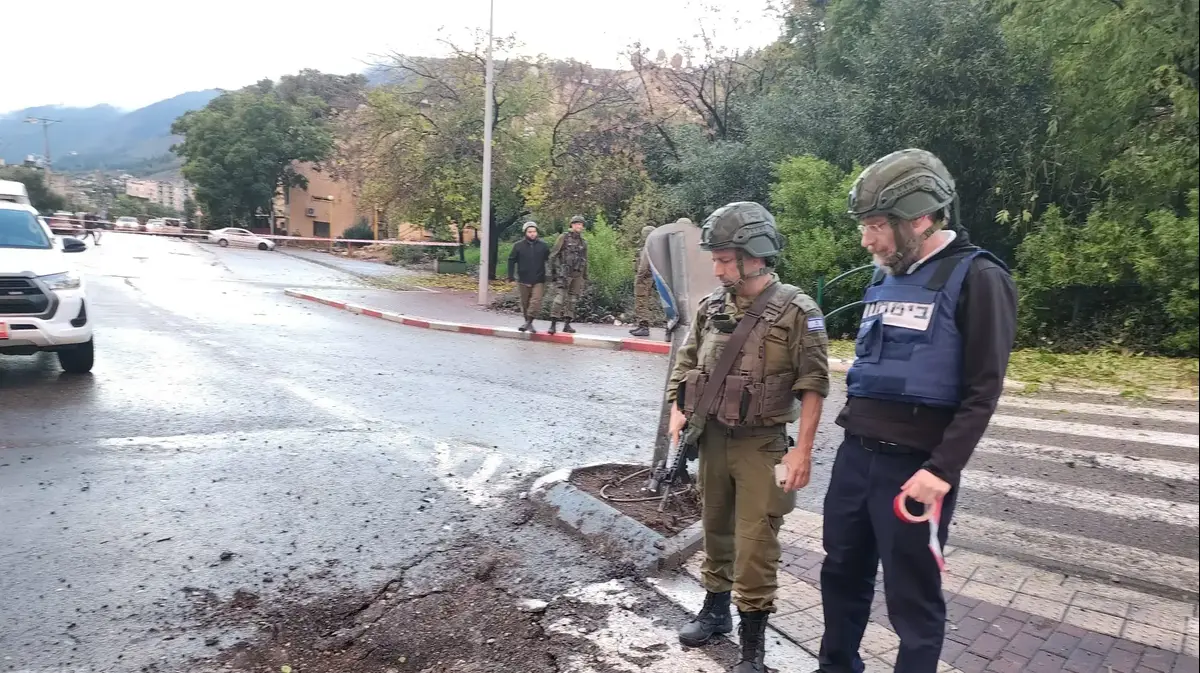Hit: "The Red Rock"
At the beginning of February 1952, a group of Israeli soldiers secretly crossed the border with Jordan, reached the Red Rock in Petra - and returned safely.
These were members of a special commando unit marked "30," which had been set up a year earlier to deal with the problem of infiltrators.
Which of the unit's 30 soldiers took part in the forbidden expedition?
The only certain information is that the group included the unit's commander, Captain Haim Dim (later Colonel), and his deputy, Aaron Kamara (later Lieutenant Colonel).
Evidence of a trip from Israel to a temple in Petra in southern Jordan, 100 km north of Eilat, has existed since the 18th century, but the difficulties of the road, the lack of water, the dangers lurking for pedestrians and more - deterred experienced travelers.
The relative proximity of the red rock to the border and the stories about its spectacular beauty, in addition to the challenge that fascinated young people in the times before the culture of backpacking around the world - ignited the imagination of adventurers in young Israel.
Haim Hefer and Yochanan Zarai's song, "The Red Rock", from 1952, performed by Arik Lavi - which became a hit - also contributed to the myth.
In 1953, three months before joining Unit 101, the illustrious fighter Meir Har-Zion left for Petra, together with former Palmach fighter Rachel Saborai. In August 1953, the bodies of five young people from the working-class settlement, who were captured on the way to Petra and shot to death by Jordanian forces, were returned to Israel.
Many of those who left for Petra in the 1950s did not return alive.
Others were forced to retrace their steps or were caught on the way.
As the number of deaths increased, Haim felt guilty - and on his own initiative asked the Prime Minister, David Ben-Gurion, to stop broadcasting his poem on the radio.
As a result, the Public Broadcasting Council in July 1958 banned the Voice of Israel from continuing to play the song - and it was banned for decades.
An indictment against the poet Avraham Shlonsky was dropped
Avraham Shlonsky in the early 1950s, Photo: Zoltan Kluger, GPO
On the morning of January 21, 1952, the renowned poet Avraham Shlonsky arrived at the Tel Aviv Magistrate's Court, where an indictment was to be read against him.
The indictment was filed due to an event held several months earlier, in which Shlonsky organized a demonstration against the government regarding wage disputes between Histadrut workers and employers, ignoring the police demand to "disperse the demonstration."
Two weeks after the incident, the poet received an invitation to a court hearing due to "the noise and commotion without sufficient cause by speeches through a loudspeaker, which caused a large crowd to gather around, in a way that might have disturbed the residents."
At the beginning of the trial, Shlonsky's defense attorney, Mordechai Landau, argued that the indictment should be dismissed for what he called "procedural defects." .
The judge, Eliyahu Manny (later a Supreme Court judge), announced a 15-minute break, and when he returned from his office he announced that "the indictment is null and void."
He even reprimanded the plaintiff, Adv. Y. Ben-Ari, with the words: "The next time you come to the courtroom with a disorderly indictment, you will be the defendant - in wasting the court's time."
"Train to Eilat - within 3 years"
Minister of Transportation Shimon Peres launches EMS train line to Eilat, 1970 (not finally established), Photo: Zoltan Kluger, GPO
At the beginning of February 1952, the government discussed an application received from a French company, which offered its services in the construction of a railway line from Be'er Sheva to Eilat.
The Minister of Transportation, David Pinkas, said that in the initial contacts, the French company announced that "if the Israeli government accepts the offer, we can guarantee that a train line to Eilat will start operating within 36 months."
During a discussion in the government, it was decided to convene a meeting of the representatives of the Railway Planning Committee.
Such a first meeting was held in less than two weeks, and the newspaper "Davar" reported that "speeding up the coordination meeting proves that the day is near when we can go out in the morning in Ayelet, wade there in the waters of the Red Sea - and return to the center that evening."
In a meeting with the planning committee, the question was raised whether a railway in the Negev is a worthwhile and possible project.
It was determined that if it is proven that a railway line to Eilat will be profitable - the engineers of the French company will be invited to an in-depth examination of the proposal.
"Office engineers suggest that in the first phase, a train will depart from Be'er Sheva in the direction of the southern Dead Sea," said Minister Pinkas, "and from there we will move in stages in the direction of Eilat."
In the past 70 years, various plans have been put forward for the public to build a railway line to Eilat, but even at the beginning of 2022, there is still no railway to the southern resort city.
Defects in postal services
On January 28, 1952, the Minister of the Post, Mordechai Norok, was interviewed by the Voice of Israel and answered questions within his area of responsibility.
"Regarding partial postal services, we know we are lacking, as in 77 localities across the country there is still no post office, and in more than 500 branches we provide the public with only partial postal services," the minister admitted, adding: "It all depends on the budget we receive. Budget - Citizens will receive improved postal services. "
Minister Norok explained that "Finance Minister Eliezer Kaplan believes that letter senders can wait a few more days for the mail to arrive, while the hungry can not wait for the next meal. Therefore the finance budget is directed more to food - and less to the luxury of sending a letter."
Post Office Sign, 1952,
Asked why citizens who order a telephone line have to wait many months for it to be installed, Norok replied: "The problem is not with the installation teams, nor the lack of telephones, but a completely different matter. "We will not be able to install new phones."
"German citizen wants to visit"
On January 24, 1951, the Prime Minister's Office in Tel Aviv received a telegram from a German citizen, a resident of Hamburg, Arik Lith, requesting an entry visa to visit Israel.
Ministry officials wondered if this was an initiative of the West German government, designed to test Israel's willingness to move forward with relations at this stage.
The answer sent from Israel to the German citizen was: "The time for mutual visits is not yet ripe" (these only began towards the end of the decade).
Beatings in "Samson and Delilah"
On Friday, January 25, 1952, a serious brawl broke out near the box office of the "Zion" cinema in Jerusalem, which was scheduled to begin on Saturday night with the screening of the film "Samson and Delilah," for which many were waiting.
Police, who arrived quickly, arrested the hawks and dispersed the crowd.
An hour later, two policemen returned to the scene, to make sure there were no speculators among the ticket buyers in the early purchase.
The missing / concepts that were
Beatniks
Beatnik in Eilat, Photo: David Eldan, GPO
A name given in the 50s to the movement of anti-establishment youth, especially in the US, who advocated breaking social conventions and were the main inspirational model for the growth of the hippie movement, their successors, from the mid-60s. As a result, the derogatory nickname "Beatniks" spread in Israel - which was hurled at anyone who lived a "purposeless life of vanity" and used drugs such as cannabis.
The grocery store / items we collected
coins
Photo: Nostalgia Online Archive,
In the first decades after the establishment of the state, almost every young person in the country had a collection as a hobby.
Along with stamps, dried flowers, cards and even insects, many used to collect coins that were used as a means of payment in the Land of Israel - and later in the State of Israel.
Each self-respecting coin collector was provided with an album with special round holes, into which each coin was threaded so that it could be displayed to the eyes of all.
Finally: Banknotes with the name "Israel"
Source: Bank of Israel,
Towards the establishment of the state, in May 1948, the People's Council decided that the Anglo-Palestine Bank owned by the Jewish Agency would issue new banknotes.
As the official name of the country had not yet been determined at the time, the banknotes were printed under the name Anglo-Palestine Bank.
In 1951, when Anglo-Palestine became a national bank, new banknotes with the name "Israel" were designed (pictured).
In January 1952 these banknotes were approved by the government - and in June of that year they became legal tender in Israel (at values of half, 1, 5, 10 and 50 pounds).
By the way, the 50-pound bill seen in the photo is currently worth 170,000 shekels in the collectibles market
Ads that were
Do you have pictures or souvenirs from the first days of the country? Write to us: Yor@ShimurIsrael.Org
Were we wrong?
Fixed!
If you found an error in the article, we'll be happy for you to share it with us












/cloudfront-eu-central-1.images.arcpublishing.com/prisa/KMEYMJKESBAZBE4MRBAM4TGHIQ.jpg)


